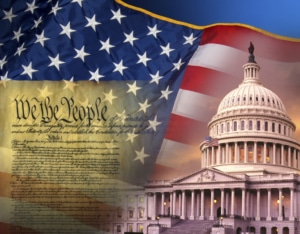By Mark I. Melo, Esq.
As the COVID-19 pandemic continues to rage on, we have all had to change our lifestyles to some extent, finding different means of doing things than before. For example, on the recent 4th of July holiday, the beautiful fireworks shows that so many of us enjoy were prohibited by many counties in California. Even so, we found alternate ways to celebrate. On an on-going basis, many of us are now spending more time online doing things we normally would have done in person. We are ordering our groceries for delivery, instead of going to the market; chatting with friends and family via Zoom, instead of meeting for coffee; and doing classwork or working remotely from home, instead of going to school or into the office.
As times change, so do our laws. The United States Constitution is a notable example of this. Thankfully, the framers of our Constitution realized that change and reform would be necessary over time. The Bill of Rights, which constitute the first ten amendments to the Constitution, and the following seventeen amendments have proven that the framers were right.
In their role of interpreting our laws, our courts often expand or limit both the laws’ application and individuals’ rights. Last month, the California Court of Appeal’s ruling in the case of Martinez v. San Diego County Credit Union was a win for individuals’ rights (although possibly a challenge for businesses). This ruling will help more people with disabilities assert their own independence by accessing more online businesses and services on their own.
What happened in the Martinez case?
In 2017, Mr. Martinez, who is blind, sued his credit union because its official website was not compatible with software that allowed him to “read” online content. This software reads special codes on websites and then translates the sites’ contents into audible speech which can be played on his computer. Mr. Martinez explained that this kind of screen-reading software was “the only method by which a blind person may independently access the Internet.”
Mr. Martinez claimed that in creating an official website that was not compatible with this type of software, the Credit Union violated California’s Civil Rights Act. Because this Act was passed in 1959—long before the Internet and websites existed—the Court was essentially being asked to consider an application of the law that could not have been anticipated by its framers.
The Act requires that all disabled persons be given “equal access” to “public accommodations.” Since other, non-blind customers could arrange for in-person appointments or learn more about banking options through the website, Mr. Martinez claimed he was denied equal access to all of the services that the Credit Union had to offer.
The Court agreed with Mr. Martinez and decided that the Credit Union website was covered by the state’s Civil Rights Act. Although the Act predated the existence of websites, the Court accepted that “websites have become central to American life.”
The Court also said something we already knew: That “during the current pandemic, the Internet and websites have become even more critical.” As the pandemic is forcing more of us to depend on the Internet to shop for groceries, order prescriptions, or just carry out our daily business, it is more important than ever for people with disabilities to have equal access to the Internet as well.
Conclusion
Over 200 years ago Thomas Jefferson wrote, “A strict observance of the written law is doubtless one of the high duties of a good citizen, but it is not the highest. The laws of necessity, of self-preservation, of saving our country when in danger, are of higher obligation.” The writers of the state’s Civil Rights Act might not have imagined a website on a computer screen becoming an “accommodation” or “facility.” Nonetheless, the Court in the Martinez case showed the importance of adapting with the times, and interpreting laws based on practical necessity.
As the Martinez case illustrates, California’s Civil Rights Act and the Americans with Disabilities Act are being cited in an increasing number of lawsuits targeting businesses over the accessibility of their websites. If you have any questions as to how this ruling might affect your business, feel free to contact Bradley, Gmelich & Wellerstein LLP so we can help you with your specific needs.


